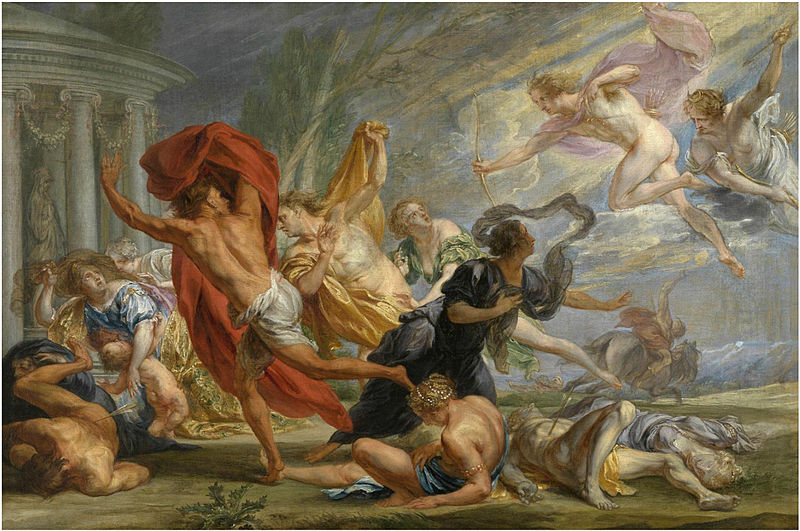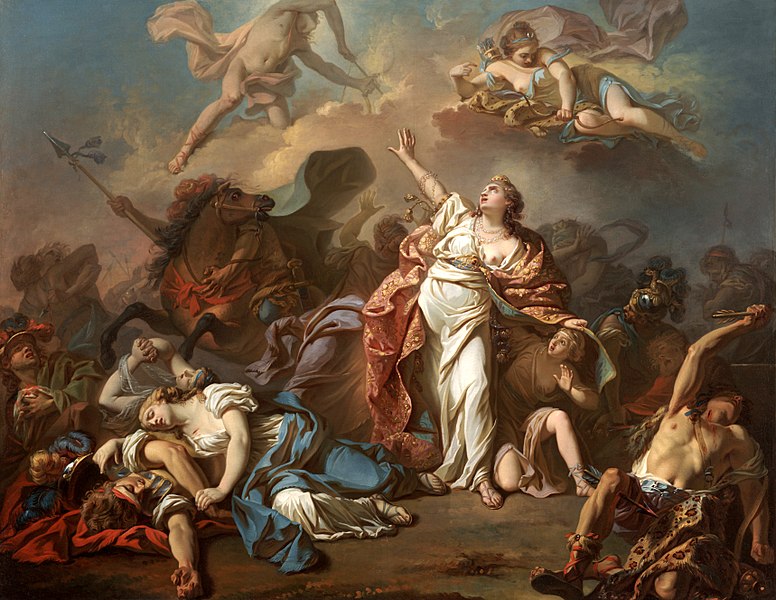THE NIOBIDS IN GREEK MYTHOLOGY
The Niobids in Greek mythology
The Niobids was the collective name given to the children of King Amphion of Thebes, and his wife Niobe. The Niobids are best remembered from a tale in Greek mythology that see them slaughtered by Apollo and Artemis because of their mother’s hubris.
The Niobids and Thebes
The setting for the tale of the Niobids is the city of Thebes, where Amphion and Zethus, sons of Zeus, had usurped the rule of Lycus (who himself was a usurper).
Amphion and Zethus would briefly rule together, though, Zethus would commit suicide when his wife killed their son. Amphion found himself a wife of good standing, for he married Niobe, the daughter of King Tantalus.
Amphion and Zethus would briefly rule together, though, Zethus would commit suicide when his wife killed their son. Amphion found himself a wife of good standing, for he married Niobe, the daughter of King Tantalus.
The Niobids
|
Niobe would give birth to a number of children by Amphion, although there is little agreement in the ancient sources about the number, with a range between 4 and 20 given. It was generally agreed that there were an equal number of sons and daughters born to Amphion and Niobe.
As there is no agreement on numbers of children, there is no agreement on names, but in the Bibliotheca, 7 sons and 7 daughters are named; the sons being Agenor, Damasichthon, Eupinytus, Ismenus, Phaedimus, Sipylus and Tantalus, whilst the daughters are named as, Astycrateia, Astyoche, Cleodoxa, Ethodaia, Ogygia, Pelopia and Phthia. No matter how many, nor what their names might have been, the children of Amphion and Niobe were collectively known as the Niobids. The Hubris of NiobeNiobe would begin to think more and more highly of herself, for she held position and had wealth, and now had a multitude of healthy children; and Niobe would begin to wonder why the population of Thebes worshipped gods and goddesses rather than herself.
Niobe would then proclaim herself superior to the gods, and in particular, superior to Leto, for whilst Leto, the goddess of motherhood, had but two children, Apollo and Artemis, Niobe had many. |
|
The dEath of the Niobids
Such hubris is unlikely to go unnoticed by the gods and goddesses, and Apollo and Artemis took it upon themselves to avenge their insulted mother.
Thus, the son and daughter of Leto came to Thebes, and taking up their bow and arrows shot down the Niobids, with Apollo killing the sons of Amphion, and Artemis, the daughters.
Amphion would fall upon his own sword when he saw his children dead, whilst Niobe, overcome by grief could do nothing but weep.
For several days the bodies of the Niobids lay unburied, for whilst the massacre of the Niobids had been taking place, Zeus had turned the Thebans to stone, but eventually, the gods themselves decided to bury the Niobids.
The death of the Amphion and the Niobids meant that this short-lived dynasty came to an end, and Laius, the rightful ruler of Thebes, became king.
Thus, the son and daughter of Leto came to Thebes, and taking up their bow and arrows shot down the Niobids, with Apollo killing the sons of Amphion, and Artemis, the daughters.
Amphion would fall upon his own sword when he saw his children dead, whilst Niobe, overcome by grief could do nothing but weep.
For several days the bodies of the Niobids lay unburied, for whilst the massacre of the Niobids had been taking place, Zeus had turned the Thebans to stone, but eventually, the gods themselves decided to bury the Niobids.
The death of the Amphion and the Niobids meant that this short-lived dynasty came to an end, and Laius, the rightful ruler of Thebes, became king.
A Niobid Survives?
|
Now, it was generally considered that no one survived amongst the Niobids, but occasionally it was suggested that one, or two, of the children of Amphion and Niobe did survive.
Most commonly it was suggested that a daughter, Meliboea, survived the attack having prayed to the goddess Leto. Having witnessed the death of her siblings, her skin turned pale, and Meliboea was thereafter known as Chloris. |
|
Chloris would become Queen of Pylos, having married Neleus, and would become mother to many, including Nestor. Those that think no-one survived the massacre of the Niobids, though, tell of this Chloris being the daughter of a different Amphion.
Similarly, a few sources tell of one of the male Niobids, Amyclas, surviving the killing of his siblings, by also pleading with Leto. Amyclas was said to have left Thebes when Laius became king, and travelling to Laconia, established the city of Amyclae, although this founding was more commonly said to have been done by Amyclas, son of Lacedaemon.
Similarly, a few sources tell of one of the male Niobids, Amyclas, surviving the killing of his siblings, by also pleading with Leto. Amyclas was said to have left Thebes when Laius became king, and travelling to Laconia, established the city of Amyclae, although this founding was more commonly said to have been done by Amyclas, son of Lacedaemon.
|
|
Colin Quartermain - Niobids - 29th December 2019

